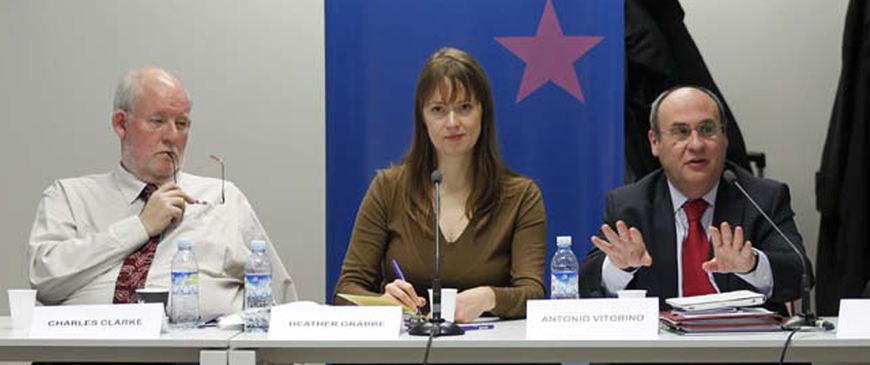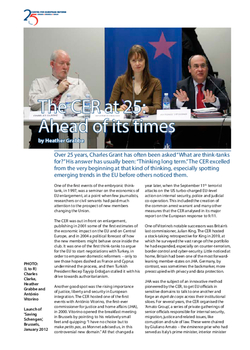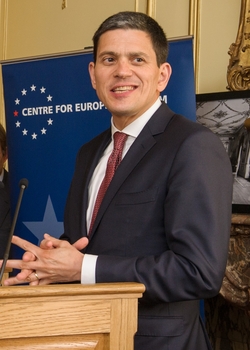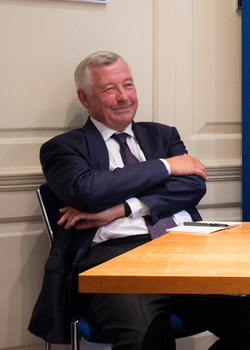
The CER at 25: Ahead of its times
Over 25 years, Charles Grant has often been asked “What are think-tanks for?” His answer has usually been: “Thinking long term.” The CER excelled from the very beginning at that kind of thinking, especially spotting emerging trends in the EU before others noticed them.
One of the first events of the embryonic think-tank, in 1997, was a seminar on the economics of EU enlargement, at a point when few journalists, researchers or civil servants had paid much attention to the prospect of new members changing the Union.
The CER was out in front on enlargement, publishing in 2001 some of the first estimates of the economic impact on the EU and on Central Europe, and in 2004 a political forecast of how the new members might behave once inside the club. It was one of the first think-tanks to argue for the EU to start negotiations with Turkey, in order to empower domestic reformers – only to see those hopes dashed as France and Cyprus undermined the process, and then Turkish President Recep Tayyip Erdoğan stalled it with his drive towards authoritarianism.
Another good spot was the rising importance of justice, liberty and security in European integration. The CER hosted one of the first events with António Vitorino, the first-ever commissioner for justice and home affairs (JHA), in 2000. Vitorino opened the breakfast meeting in Brussels by pointing to his relatively small feet and quipping: “I have no choice but to make petits pas, as Monnet advised us, in this controversial new domain.” All that changed a year later, when the September 11th terrorist attacks on the US turbo-charged EU-level action on internal security, police and judicial co-operation. This included the creation of the common arrest warrant and many other measures that the CER analysed in its major report on the European response to 9/11.
One of Vitorino’s notable successors was Britain’s last commissioner, Julian King. The CER hosted a stock-taking retrospective for King in 2019, at which he surveyed the vast range of the portfolio he had expanded, especially on counter-terrorism, border control and cyber-security. Little noticed at home, Britain had been one of the most forward-leaning member-states on JHA. Germany, by contrast, was sometimes the backmarker, more preoccupied with privacy and data protection.
JHA was the subject of an innovative method pioneered by the CER, to get EU officials in sensitive domains to talk to one another and forge an ésprit de corps across their institutional siloes. For several years, the CER organised the ‘Amato Group’, a series of private gatherings of senior officials responsible for internal security, migration, justice and related issues, like corruption and rule of law. These were chaired by Giuliano Amato – the éminence grise who had served as Italy’s prime minister, interior minister and constitutional court judge. The group enabled those working on these politically neuralgic subjects – whether from the EU institutions or national ministries – to speak openly about their hopes, concerns and frustrations, and it also published some ground-breaking reports. Giuliano’s ironic summing up would often begin with: “If our political masters were wiser, they would have agreed with us that …”
Another methodological innovation developed by the CER was shadow reporting on the performance of member-states. The Commission has long produced various scoreboards that compare national performance, most notably on the implementation of single market regulations and more recently on the rule of law. But the CER was the first think-tank to start publishing its own independent annual assessment of progress. Its ‘Lisbon Scorecard’, published every year from 2001 to 2010, judged the performance of the member-states in fulfilling their pledges on the Lisbon agenda of economic reform. The CER did not mince words, describing countries as leaders or laggards in creating a knowledge-based competitive economy. Following publication, the phone lines to the CER’s small office rang hot, with diplomats and government economists calling to protest that their country’s performance was really much better than we had described, and offering 'better data' for next year’s assessment. What a feeling of power for the 30 year-olds who had written the scorecard!
The CER’s great innovation in foreign and security policy was to campaign for the merger of the positions of the High Representative – from 1999 to 2009 Javier Solana, sitting in the Council of the EU – and the commissioner for external relations. The aim was to bring together the EU’s diplomacy with its money and its external policies, managed by the European External Action Service (the EEAS, an embryonic foreign ministry) that would include a global diplomatic network for sharing intelligence and analysis. When the merger finally happened in 2010, it was a Briton, Cathy Ashton, who became the first EU High Representative for Foreign and Security Policy.
So far the results of the new post and the EEAS have been somewhat less impressive than the CER – in analysing the potential benefits – had promised. Blame for an insufficient number of common foreign policies lies partly with the Commission, which undermined the fledgling institution by keeping control of many external policies; but also with the member-states, which have failed over and over again to agree on unified positions. At a CER event during her time as High Rep, Baroness Ashton came up with a new answer to Henry Kissinger’s famous question about what number to call if he wanted to talk to Europe. “You can call my number,” she said. “And it will offer a range of options: Press 1 for the French position, 2 for the German position, 3 for Italy …”
One of the most recent examples of the CER’s foresight was the new line of work started in 2021 on how climate change and energy challenges are transformng Europe. In addition to ground-breaking analysis of how trade and energy policies could help to combat climate change, the CER has been publishing research on longer-term but acute environmental risks, such as water scarcity in the Maghreb, that EU policy-makers need to pay attention to even during the current ‘polycrisis’.
The great institutional innovation within the CER itself was to expand into Brussels and Berlin; essential for a London-based European think-tank that wanted to remain relevant on the many issues beyond Brexit. Non-Brits have always made up about half of the CER’s staff, and its identity has become steadily more pan-European.
From the earliest days, CER publications have carried the Financial Times’ summary of its identity: “Pro-European but not uncritical.” This very British double-negative often raised quizzical eyebrows in other capitals, especially Washington DC, where think-tanks blow their own trumpets much more loudly. But it sums up the CER’s approach, despite and beyond Brexit: support for European integration, while recognising where the EU fails to achieve its goals and urging reforms to make it work better.
Another way of describing this approach is to Europeanise Winston Churchill’s famous remark about democracy thus: “The EU is the worst form of governance, except for all those other forms tried from time to time on the European continent…” The EU has not yet lasted as long as the Holy Roman Empire or some of the other forms of pan-European governance tried over the centuries, from the Hanseatic League to the Habsburgs. But it is delivering far better results for citizens than the others ever did. The CER can claim some of the credit for improving its performance in many areas over the past quarter-century.
Heather Grabbe was deputy director of the CER from 2000 to 2004. She subsequently worked as an adviser to commissioner Olli Rehn and was then director of the Open Society European Policy Institute from 2009 to 2022.



